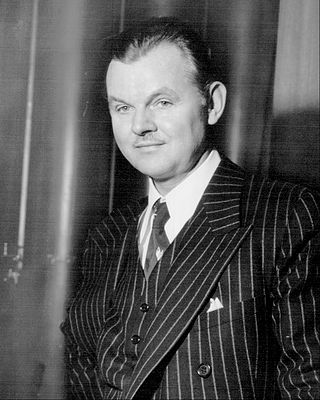
Lawrence Mervil Tibbett was an American opera singer and recording artist who also performed as a film actor and radio personality. A baritone, he sang leading roles with the Metropolitan Opera in New York City more than 600 times from 1923 to 1950. He performed diverse musical theatre roles, including Captain Hook in Peter Pan in a touring show.

Holiday is a 1930 American pre-Code romantic comedy film which tells the story of a young man who is torn between his free-thinking lifestyle and the tradition of his wealthy fiancée's family. It stars Ann Harding, Mary Astor, Edward Everett Horton, Robert Ames and Hedda Hopper. It was produced and released by Pathé Exchange.

George Bancroft was an American film actor, whose career spanned seventeen years from 1925 to 1942. A star of pre-Code Hollywood, he is best known as the tough guy lead in four Josef von Sternberg films, the last of which, Thunderbolt (1929) earned him a Best Actor Award nomination. He was later a supporting actor in a number of notable movies, including Mr. Deeds Goes to Town (1936) and Stagecoach (1939).

Pre-Code Hollywood was an era in the American film industry that occurred between the widespread adoption of sound in film in the late 1920s and the enforcement of the Motion Picture Production Code censorship guidelines in 1934. Although the Hays Code was adopted in 1930, oversight was poor, and it did not become rigorously enforced until July 1, 1934, with the establishment of the Production Code Administration. Before that date, film content was restricted more by local laws, negotiations between the Studio Relations Committee (SRC) and the major studios, and popular opinion than by strict adherence to the Hays Code, which was often ignored by Hollywood filmmakers.
Nightmare in the Sun is a 1965 drama film directed by Marc Lawrence in his feature theatrical directing debut. It stars Ursula Andress, John Derek, and Aldo Ray, with a cameo appearance by Sammy Davis Jr. and an early role of Robert Duvall.

Children of Divorce is a 1927 American silent romantic drama film directed by Frank Lloyd and starring Clara Bow, Esther Ralston, and Gary Cooper. Adapted from the 1927 novel of the same name by Owen Johnson, and written by Louis D. Lighton, Hope Loring, Alfred Hustwick, and Adela Rogers St. Johns, the film is about a young flapper who tricks her wealthy friend into marrying her during a night of drunken revelry. Even though she knows that he is in love with another woman, she refuses to grant him a divorce and repeat the mistake of her divorced parents. Produced by Jesse L. Lasky, E. Lloyd Sheldon, and Adolph Zukor for the Famous Players–Lasky, the film was released on April 25, 1927 by Paramount Pictures.
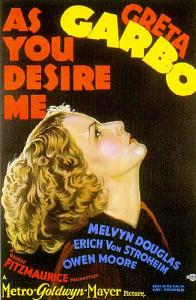
As You Desire Me is a 1932 American pre-Code film adaptation of the 1929 play by Luigi Pirandello released by Metro-Goldwyn-Mayer. It was produced and directed by George Fitzmaurice with Irving Thalberg as co-producer. The adaptation was by Gene Markey, the cinematography by William H. Daniels, the art direction by Cedric Gibbons and the costume design by Adrian.

High Society Blues is a 1930 American pre-Code film starring Janet Gaynor and Charles Farrell. The movie was written by Howard J. Green from the story by Dana Burnett, and directed by David Butler.
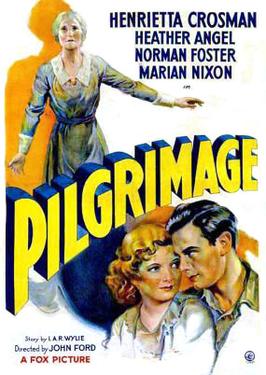
Pilgrimage is a 1933 American pre-Code drama film directed by John Ford. The film was a box office disappointment for Fox.
New Moon is a 1930 black-and-white American, pre-Code romantic/drama/melodrama musical film version of the operetta The New Moon, with music by Sigmund Romberg and book and lyrics by Oscar Hammerstein II and others. The original stage version premiered on Broadway in 1928. The 1930 film is also known as Komissa Strogoff in Greece, Nymånen in Denmark and Passione cosacca in Italy. A second adaptation, also titled New Moon, was released in 1940.

The Racketeer is a 1929 American Pre-Code drama film. Directed by Howard Higgin, the film is also known as Love's Conquest in the United Kingdom. It tells the tale of some members of the criminal class in 1920s America, and in particular one man and one woman's attempts to help him. Gossip columnist Hedda Hopper appears in a minor role. The film is one of the early talkies, and as a result, dialogue is very sparse.

Pre-Code sex films refers to movies made in the Pre-Code Hollywood era, roughly encompassed between either the introduction of sound in the late 1920s or February 1930 and December 1934. This period was marked by an increase of sensationalistic content in pictures made by the major studios in a climate marked by the Great Depression and major debates on morality, often containing sexual references and images that were contrary to the yet to be enforced Hays Code. Pre-Code sex films explored women's issues and challenged the concept of marriage, and aggressive sexuality was the norm. The sexual subject matter of the uncensored period was found within many movie genres, most especially in dramas, crime films, exotic-adventure films, comedies and musicals.

The Wheel of Life is a 1929 American pre-Code romantic drama sound film directed by Victor Schertzinger and starring Richard Dix and Esther Ralston. It was produced and distributed by Paramount Pictures.

Rebound is a 1931 American Pre-Code drama film starring Ina Claire, Robert Ames and Myrna Loy. Directed by Edward H. Griffith, the film is based on the play of the same name by Donald Ogden Stewart.

The Wizard of Baghdad is a 1960 American comedy/fantasy film directed by George Sherman and starring Dick Shawn, Diane Baker, and Barry Coe. It was released by 20th Century Fox.
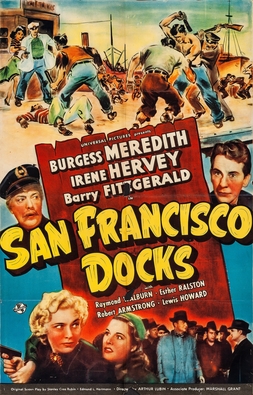
The San Francisco Docks is a 1940 American crime drama film directed by Arthur Lubin and starring Burgess Meredith, Barry Fitzgerald, and Irene Hervey.

Love and Learn is a lost 1928 silent film comedy directed by Frank Tuttle and starring Esther Ralston. Famous Players–Lasky produced the picture with released through Paramount Pictures.

The Cuban Love Song is a 1931 American pre-Code musical film directed by W.S. Van Dyke and written by C. Gardner Sullivan, Bess Meredyth, John Lynch, John Colton, Gilbert Emery, Robert E. Hopkins and Paul Hervey Fox. The film stars Lawrence Tibbett, Lupe Vélez, Ernest Torrence, Jimmy Durante, Karen Morley and Louise Fazenda. The film was released on December 5, 1931 by Metro-Goldwyn-Mayer.

Forced Landing is a 1935 American mystery film directed by Melville W. Brown and written by William Scott Darling. The film stars Esther Ralston, Onslow Stevens, Sidney Blackmer, Toby Wing, Edward Nugent and Barbara Pepper. Forced Landing was released on November 2, 1935, by Republic Pictures.
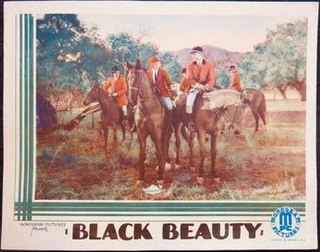
Black Beauty is a 1933 American pre-Code drama film directed by Phil Rosen and starring Esther Ralston, Alexander Kirkland and Gavin Gordon. It is one of a number of adaptations of Anna Sewell's 1877 novel Black Beauty, with the setting moved from Victorian Britain to a plantation in Virginia.


















